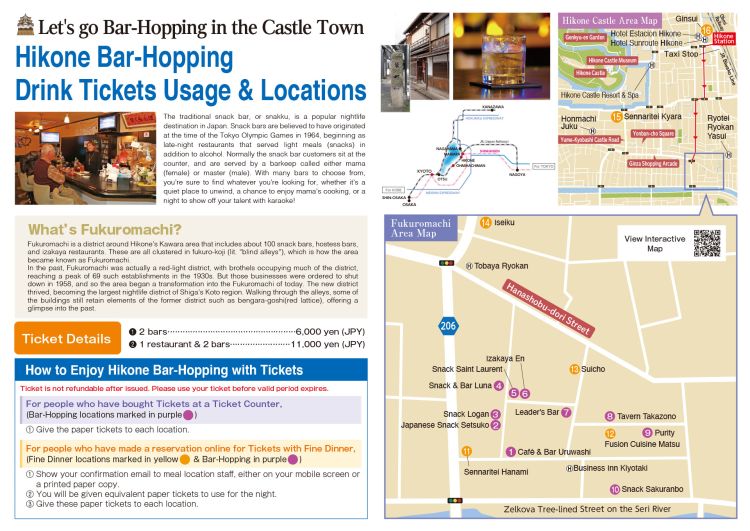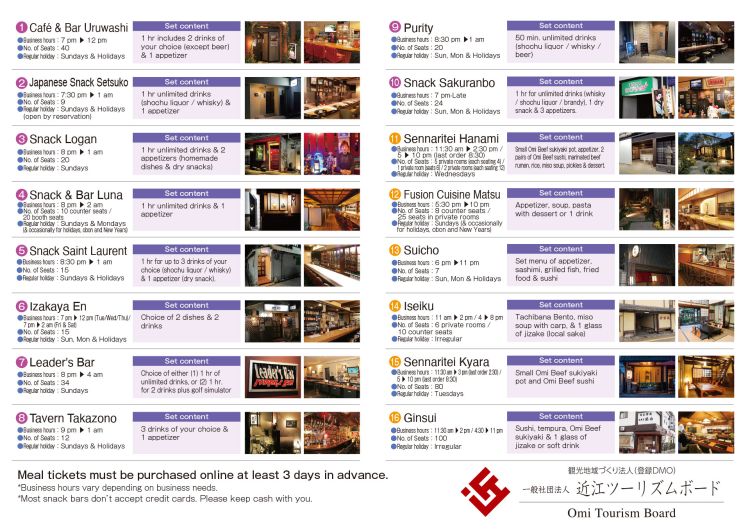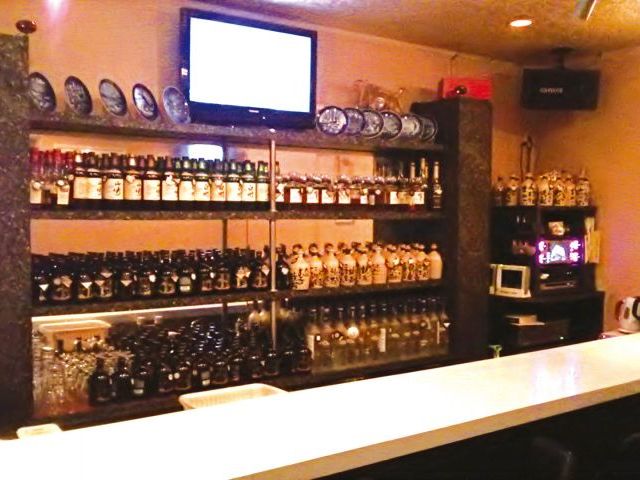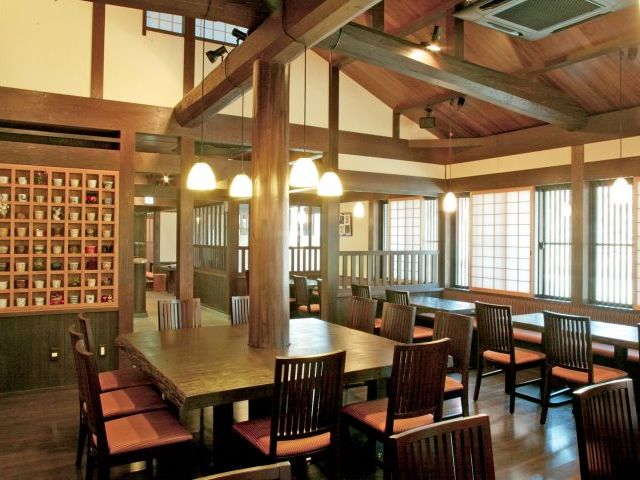Hikone Bar-Hopping Drink Tickets
Hikone Bar-Hopping Drink Tickets
Experience the real nightlife of Castle Town of Hikone that you can't find in big cities
place Area: Hikone
access_time Published: 2021.03.25
The Charming Castle Town of Hikone
Located in an abundant natural environment near the center of Japan’s main island, Hikone has thrived as a junction point of historic routes such as the Nakasendo, connecting east and west Japan. The area’s geographic advantage led to its position as a major historic center of Japan, where many battles were fought between famous warlords of the Warring States period (late 15th to late 16th c.), as evidenced by the many castle ruins that still remain.
During the Edo period (early 17th to late 19th c.), the area was controlled by the Hikone Domain, which grew to be a major domain of Japan. Its center of governance, Hikone Castle, was built and preserved by the Ii clan, who served an important role for the Edo government. The castle still stands today, as a National Treasure and iconic reminder of feudal order in the samurai era.
The rich legacy can also be felt in the traditional townscape surrounding the castle, occupied by the well-preserved former residences of merchant and military families. Walking through the historic artisans’ district of butsudan Buddhist altars, or enjoying delicious Omi Beef, which has deep ties with the Ii family, you can experience the true charm of this historic castle town.
Fukuromachi and Japan’s“ Snakku” (Snack Bar) Culture
Fukuromachi is a district around the Hikone’s Kawara area, which includes about 100 snack bars, hostess bars, and izakaya restaurants. These are all clustered in fukuro-koji (lit. “blind alleys”), which is how the area became known as Fukuromachi.
In the past, Fukuromachi was actually a red-light district, with brothels occupying much of the district, reaching a peak of 69 such establishments in 1929. But those businesses were ordered to shut down in 1958, and so the area began a transformation into the Fukuromachi of today. The new district thrived, becoming the largest nightlife district of Shiga’s Koto region (east side of Lake Biwa). Walking through the alleys, some of the buildings still retain elements of the former district such as bengara-goshi (red lattice), offering a glimpse into the past.
Fukuromachi now offers a variety of places to gather and socialize, from traditional snack bars to more casual, modern ones. Yet, the snack bar remains a popular favorite. Snack bars are believed to have originated at the time of the Tokyo Olympic Games in 1964. They began as late-night restaurants, serving light meals (snacks) in addition to alcohol. Normally the snack bar customers sit at the counter, and are served by a barkeep called either mama (female) or master (male). Typically, each bar has their own pricing system, including things like a “table charge” that includes small snacks and drinks, “bottle-keep” service allowing customers to purchase a private bottle that is kept for return visits, unlimited drinks for a set period of time, and so on. With many bars to choose from, you’re sure to find whatever you’re looking for, whether it’s a quiet place to unwind, a chance to enjoy mama’s cooking, or a night to show off your talent with karaoke!
Backround Info and Interiews with mamas and masters
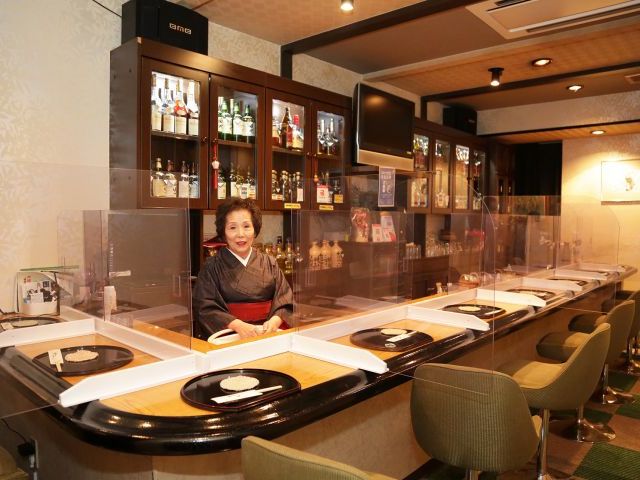
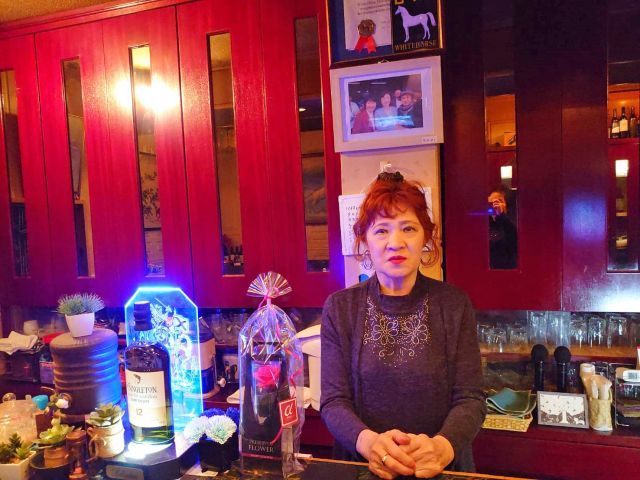
Get to know the local “mamas” and “masters” of the Fukuromachi nightlife district! They love people, Fukuromachi, and Hikone and are also great listeners, so don’t hesitate to engage them in some friendly conversation! We’re sure you’ll have a fabulous time here.
How do Bar-Hopping Drink Tickets work?
Since each bar has their own pricing system, which can be confusing for first-time visitors, we are offering easy-to-use paper tickets for your convenience to try 2 local bars and enjoy a special night out in Hikone. After purchasing ticket, visit any of the participating bars locations with the ticket.
Ticket Details
The paper tickets are for 2 bars (bar-hopping). You can buy the ticket at any of the 3 Hikone Tourist Information Center / Office near form Hikone Station or Hikone Castle. And we offer the tickets with Fine Dinner as a self-guided tour. To check the detail and book this tour, visit the page down below and purchase online.
How to buy the paper tickets?
Tickets are available for purchase at any of the 3 Tourist Information Center down below.
*Sales hours: 10am – 4pm
How to book the tickets with Fine Dinner?
Make a reservation with advanced payment online through our booking website down below.
Participating Bars and Restaurants
- Business hours or schedules may change due to pandemic conditions.
- Most snack bars don’t accept credit cards. Please keep cash with you in case you should order extra.
Bars

Japanese Snack Setsuko
Business hours: 19:30 - 1:00
No. of Seats: 9
Regular holiday: Sundays & Holidays (open by reservation)
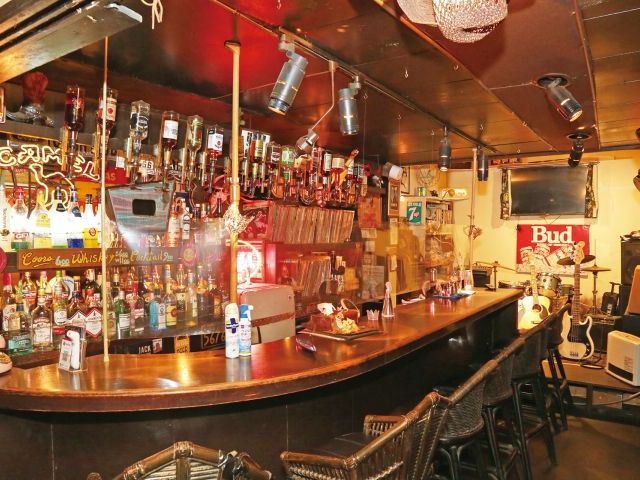
Tavern Takazono
Business hours: 21:00 - 1:00
No. of Seats: 12
Regular holiday: Sundays & Holidays

Snack Logan
Business hours: 20:00 - 1:00
No. of Seats: 20
Regular holiday: Sundays
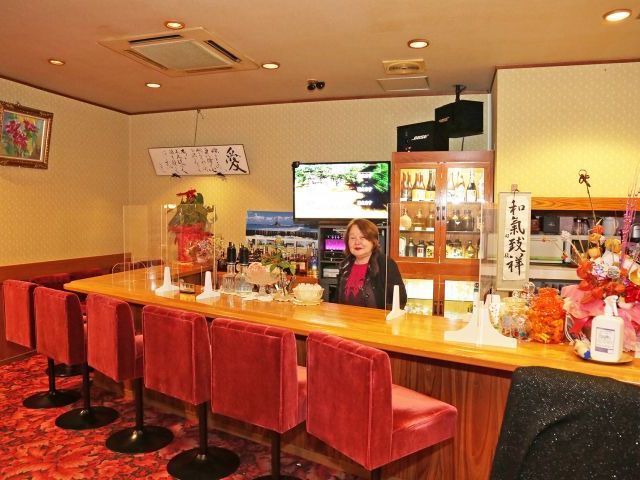
Café & Bar Uruwashi
Business hours: 19:00 - 24:00
No. of Seats: 40
Regular holiday: Sundays & Holidays
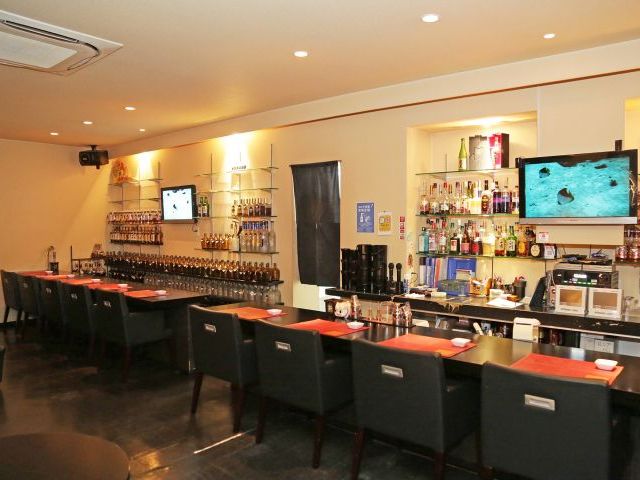
Leader’s Bar
Business hours: 20:00 - 4:00
No. of Seats: 34
Regular holiday: Sundays
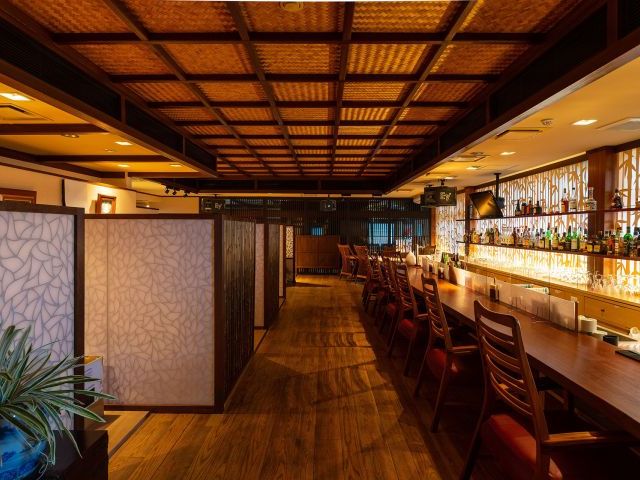
Snack & Bar Luna
Business hours: 19:00 - 2:00
No. of Seats: 10 counter seats / 20 booth seats
Regular holiday: Sundays (& occasionally for holidays, obon and New Years)
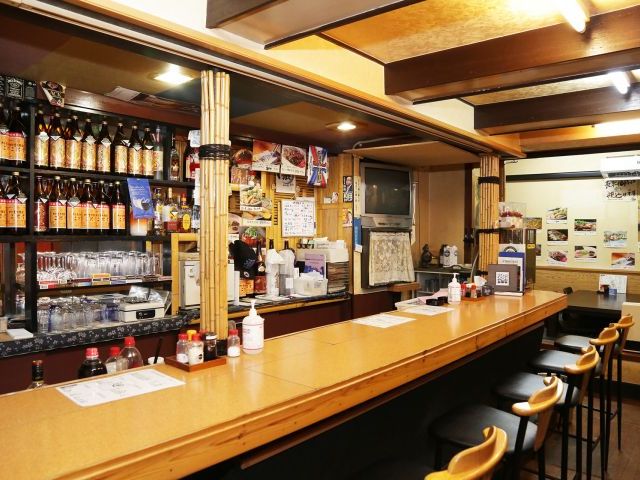
Izakaya En
Business hours: 19:00 - 24:00 (Tue / Wed / Thu) / 19:00 - 2:00 (Fri & Sat)
No. of Seats: 15
Regular holiday: Sun, Mon & Holidays
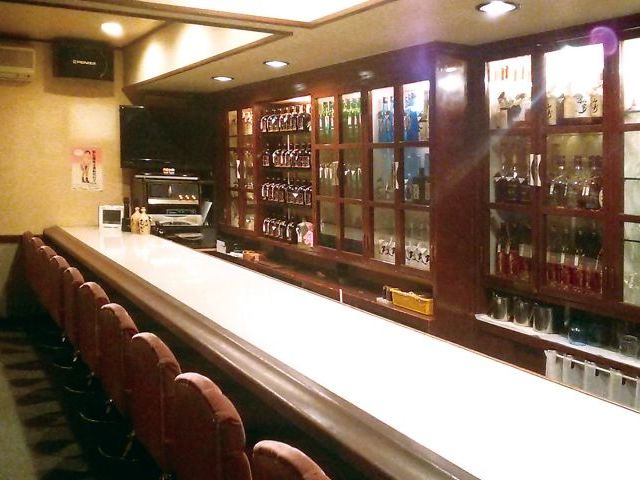
Snack Saint Laurent
Business hours: 20:30 - 1:00
No. of Seats: 15
Regular holiday: Sundays & Holidays
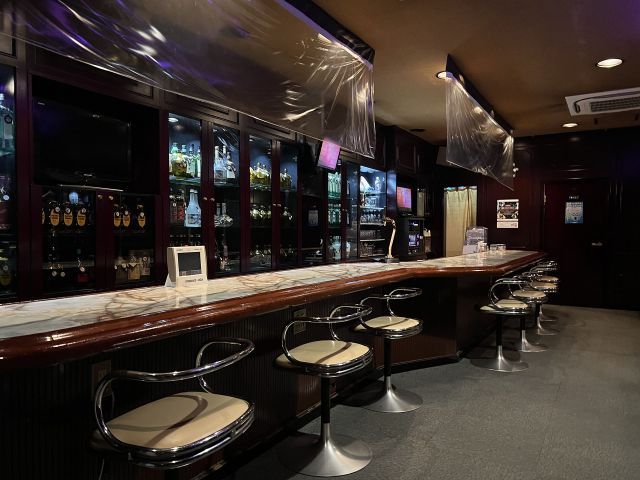
Purity
Business hours: 20:30 - 25:00
No. of Seats: 20
Regular holiday: Sun, Mon & Holidays
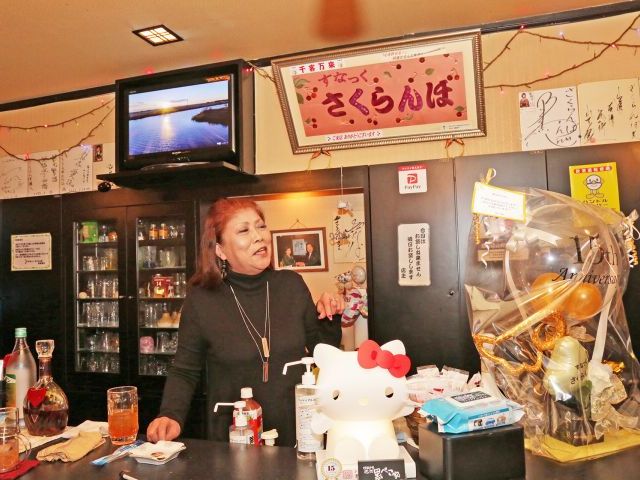
Snack Sakuranbo
Business hours: 19:00 - Late
No. of Seats: 24
Regular holiday: Sun, Mon & Holidays
Restaurants
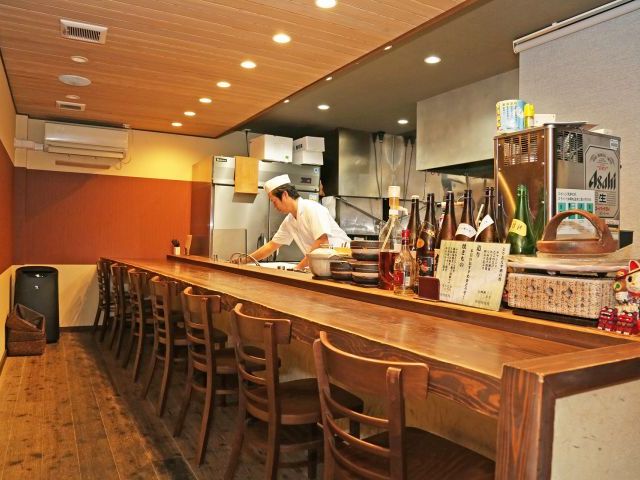
Suicho
Business hours: 18:00 - 23:00
No. of Seats: 7
Regular holiday: Sun, Mon & Holidays
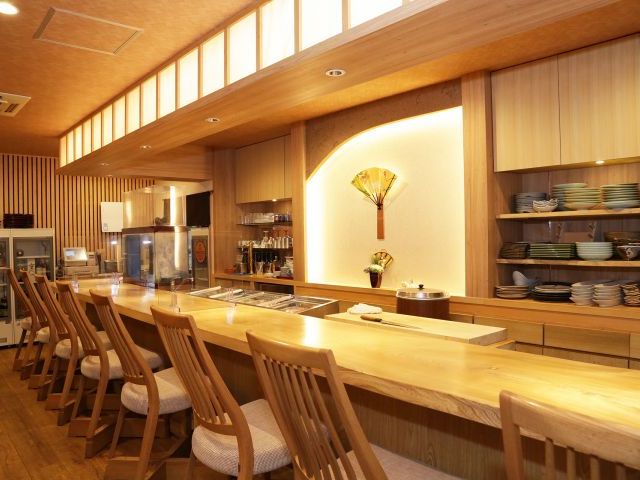
Fusion Cuisine Matsu
Business hours: 17:30 - 22:00
No. of Seats: 8 counter seats / 25 seats in private rooms
Regular holiday: Sundays (& occasionally for holidays, obon and New Years)
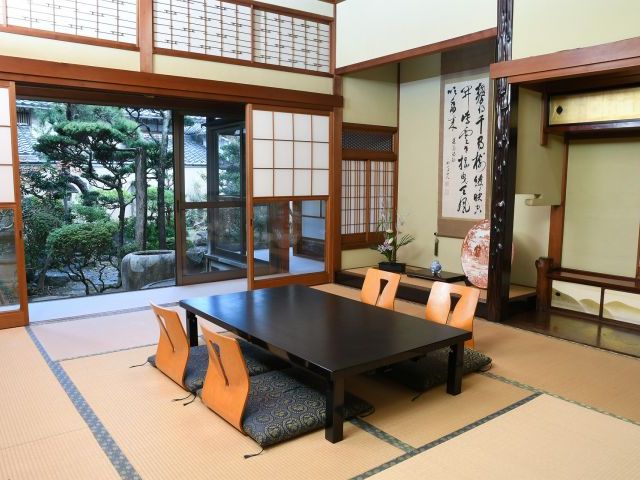
Iseiku
Business hours: 11:00 - 14:00 / 16:00 - 20:00
No. of Seats: 6 private rooms / 10 counter seats
Regular holiday: Irregular
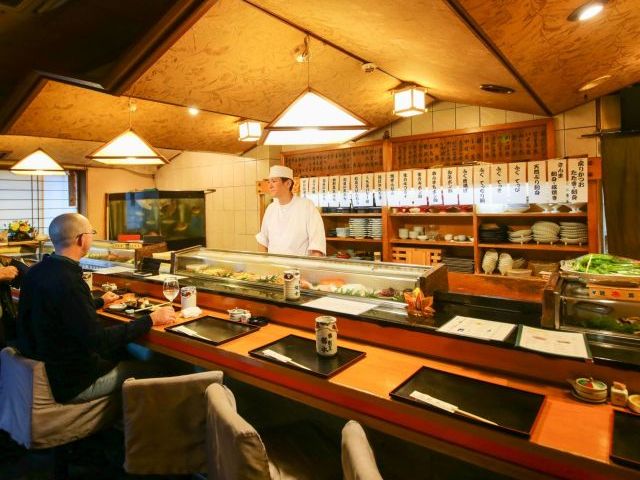
Ginsui
Business hours: 11:30 - 14:00 / 16:30 - 23:00
No. of Seats: 100
Regular holiday: Irregular
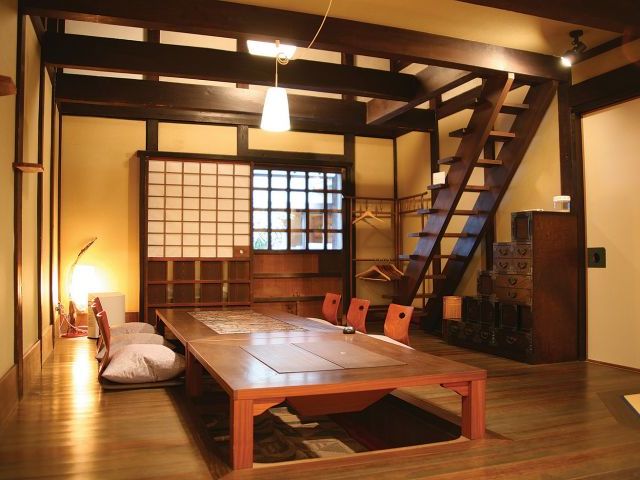
Sennaritei Kyara
Business hours: 11:30 - 15:00 (last order 14:30) / 17:00 - 22:00 (last order 20:30)
No. of Seats: 80
Regular holiday: Tuesdays
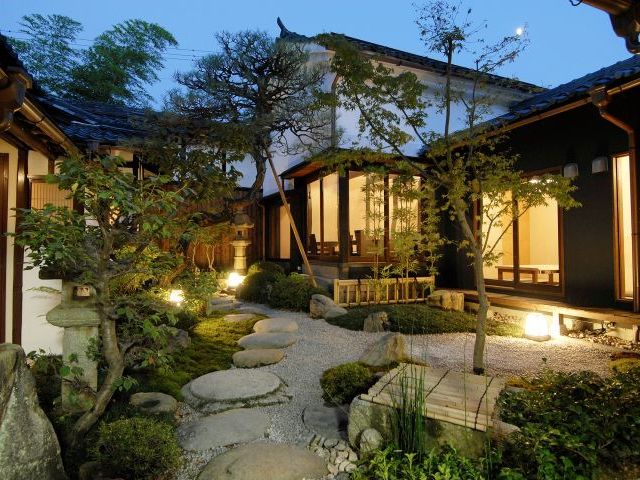
Sennaritei Hanami
Business hours: 11:30 - 14:30 / 17:00 - 22:00 (last order 20:30)
No. of Seats: 5 private rooms (each seating 4) / 1 private room (seats 6) / 2 private rooms (each seating 12)
Regular holiday: Wednesdays

